Highfields School









-24
IntroductionA-Levels are a new adventure, and we want you to love what you learn and how you learn it. The Sixth Form at Highfields is a friendly, energetic and supportive community where we want you to enjoy your time and get the rewards of studying at a high level. In five of the last six years, Highfields students have secured places at Oxford or Cambridge, and pre pandemic we were in the top 25% of schools nationally in terms of student Progress, for eight out of nine years. Whilst they have been running, students have also gained well paid Degree and Higher Apprenticeships with Balfour Beatty, National Grid and Jaguar Land Rover.
If you love what you learn, beyond what A Levels demand, then you get great results. Over the past four years, 80% of our students taking the Extended Project have achieved A* grades. These students almost invariably head for Russell Group universities or Oxbridge. This track record is the result of a tight knit group of students who create a positive, supportive and competitive atmosphere as they learn. It is also comes from a stable and passionate staff team where many of our subject specialists are also examiners. Beyond exam results, what is most important to us is that students enjoy themselves, broaden their horizons and go on to courses or careers they are happy with. We like to see the Sixth Form at Highfields as a close knit community of students and staff. Those who have moved to join us have often commented on the friendly, supportive relationships that teachers have with students. We work hard to try to ensure that all students feel they are in a professional but mutually supportive atmosphere.

We have an energetic programme of events, trips and student led groups, and are always keen to encourage initiatives that students would like to start. That is why, during assemblies, you are as likely to hear from other students as from teachers as to what is happening in the coming weeks. Students have visited a homeless shelter and had a sleep out to raise money. We started an Ambassadors programme with local charity, Helen’s Trust, and students regularly volunteer at Golding Grange day centre and at lunch clubs for the elderly, the list could go on. We value our links with the community and students arrange a Christmas Party at Denefields Court Sheltered Housing every year.
Getting a degree apprenticeship is a competitive business, so we support students with mock interviews and presentation practice, with the same care that we give to university applicants applying for most competitive courses. Sometimes students underestimate what they can achieve and where they can get to, so we’ll have a quiet word where necessary, to make sure you reach the place which best fits your talents. Wherever your ambitions lie, we’ll find ways to support you.
Most students go on to university (roughly 85% each year). Our Higher Education and Employment Programme provides various opportunities throughout the year for students and parents to explore the options open to them. We work closely with the Universities of Nottingham, Sheffield, Lancaster and Nottingham Trent to help students understand the breadth of choice available. This includes open day trips, an evening led by admissions tutors at school with the chance for parents and students to ask questions and a trip away to the Oxbridge Conference. Former students also return to give the most up to date and down to earth feedback on their courses and experiences. At the same time we help to mentor students who are looking for direct entry to employment, run a work experience programme, offer independent careers advice and provide resources to ensure they are able to sell themselves into the employment market. Every summer several students have taken up Nuffield Science and Headstart summer placements at universities, which have led to places on prestigious degree courses; and Oxbridge places over recent years have been gained in subjects including Maths, English, Natural Sciences, Politics, Philosophy, History, German and Computer Science.
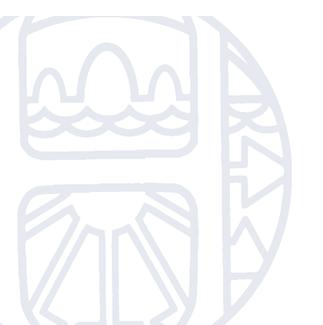
Thisisagoodschool. Ofsted,May2017 AgoodschoolwithanoutstandingSixthForm. Ofsted,October2012

Our Induction Days in summer give students and tutors the chance to come together and enjoy some time for team building and an opportunity to think about Sixth Form studies before September. We ensure that external students are well looked after and have a good feel of the school before they start. Entering the Sixth Form is an important new phase in any student’s career and we look forward to welcoming you.
I came to Highfields Sixth Form from Tibshelf School and it has been a warm, welcoming place where it is easy to make friends. Within the first few weeks I'd volunteered to help with reading at All Saints Junior school, I was driven down there and introduced to teachers. I then kept up the project all year, it was great seeing children who struggled with reading progress.
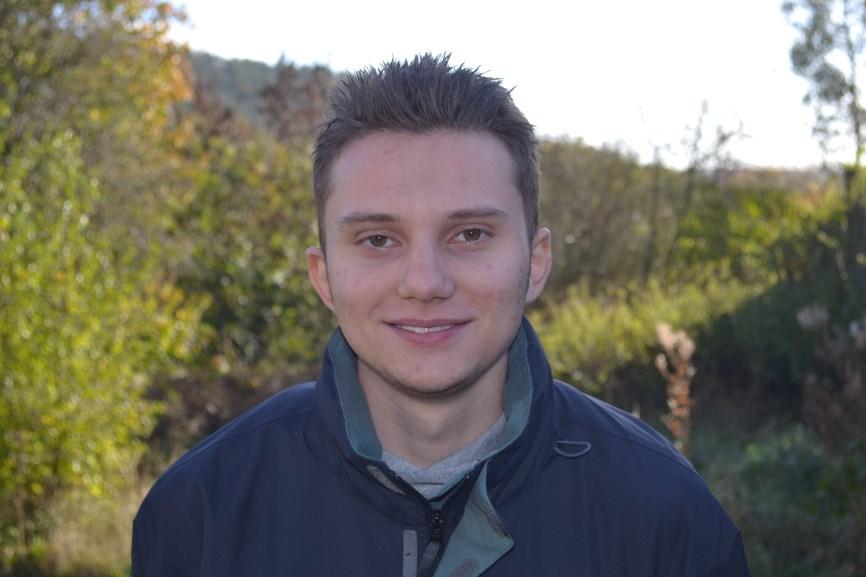
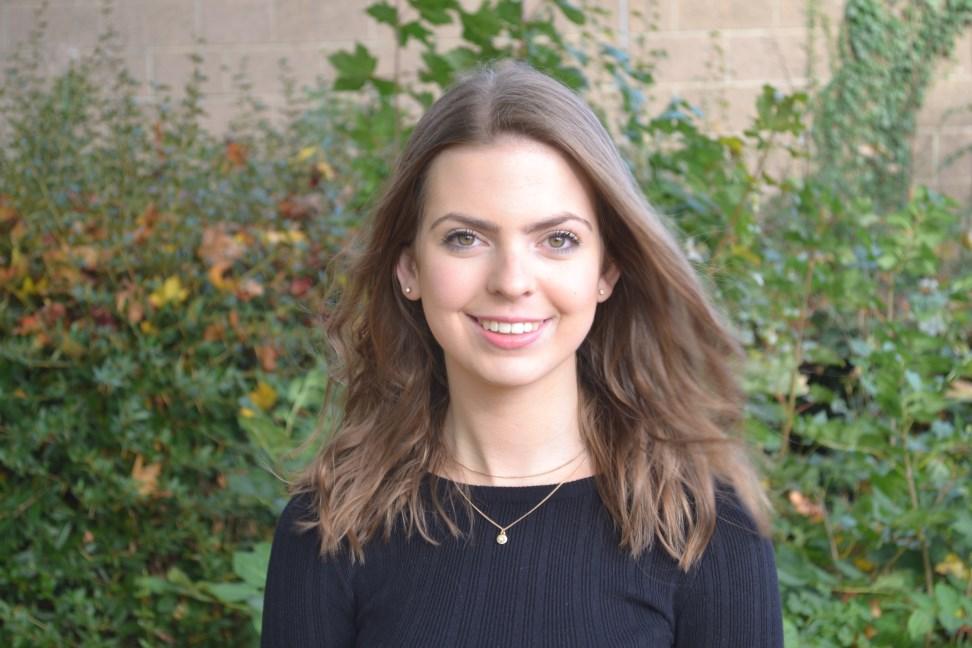

I chose to do an Extended Project into Modern Surveillance Legislation, because I want to study Law at university. I received lots of help with decoding the legal jargon throughout the course of my project. At Highfields, I have enjoyed studying my subjects because the teachers are passionate about what they teach and so are all the students. This makes learning engaging and interesting. I've had lots of help with my application to Cambridge and I'd say to anyone thinking of Highfields that it's definitely worth a bus journey!
After attending my previous school for five years, moving to Highfields Sixth Form has been the most positive experience. I received such a warm welcome and have made some wonderful friends.
The teachers were very helpful and also arranged for a group of us to volunteer at Golding Grange, a local day care centre which has been a very rewarding experience. I have thoroughly enjoyed my time here and would highly recommend it.

Thisisagoodschool. Ofsted,May2017 AgoodschoolwithanoutstandingSixthForm. Ofsted,October2012

Ultimately, hearing from our own students is often the best way of learning about the Sixth Form opportunities and atmosphere...Connor Amelia
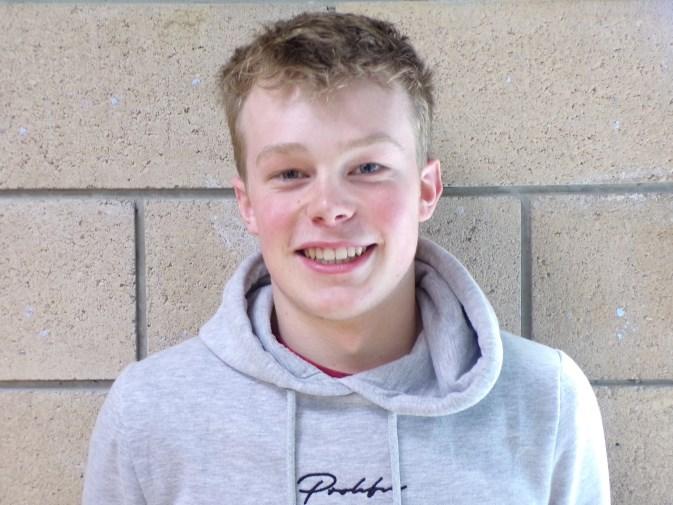
During my time at Highfields Sixth Form I have been able to get involved in some of the amazing opportunities they offer here such as volunteering at Golding Grange day care centre and becoming an ambassador for the local charity Helen’s Trust, helping organise a number of fund raising events in school.
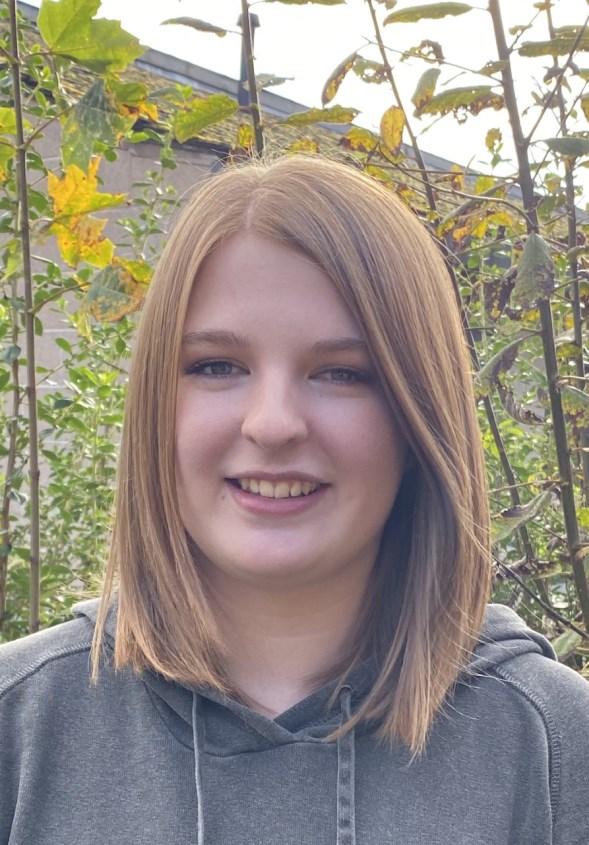
I have also been able to do an Extended Project on Biohybrid Robots with great support from staff. I have also been a member of the Student Parliament which was very rewarding. All of these opportunities have developed my confidence and this was really valuable when I gained a place on the Headstart course at Belfast Queens University in the Summer for Physical Sciences which really helped in my decision making to study Natural Sciences at University.
IsabelComing from another school, I knew very few people at Highfields, but I was put in touch with other people before I started and the teachers and students went to a lot of trouble to welcome me and make sure I felt comfortable. It didn’t take long before I felt like I’d been here for ages. I also noticed that as soon as we were isolating due to covid my teachers were immediately online and helping me in zoom lessons and by email. Although that hopefully won’t happen to you, it showed me that teachers would quickly go the extra mile to help you, and that was my experience throughout my time at Highfields. It is a very friendly environment, which made the transition from an external school a lot easier. There are lots of opportunities with extra circular activities, for example being in touch with care homes and supporting the local community. I would highly recommend taking part in these as it helps create new friendships.
Highfields Sixth Form was a fantastic experience. The sixth form team ran lots of fun activities, which provided a great social atmosphere alongside the academic work. Personally, the camping trip we went on was one of the absolute highlights of my two years in sixth form.

I was also provided with a lot of support during my application to university. I applied to study medicine, which involves a relatively intense and lengthy admissions process. I was given lots of guidance that made the application process much less stressful, including running mock interviews and providing support with my personal statement

Thisisagoodschool. Ofsted,May2017 AgoodschoolwithanoutstandingSixthForm. Ofsted,October2012

A Levels have been changing over the past few years, and now all A Level Grades are based on the exam taken at the end of Year 13 (along with coursework in some subjects). However exams at the end of Year 12 are very important for a number of reasons. They are a good indicator of how a student is performing with the increased challenge that A Levels represent, and are used for determining UCAS predicted grades. AS Level results often gave students a shock, and were the necessary reminder of just how hard you need to work to fulfil your potential at A Level. Therefore the Year 12 exams will be based on national A Level standards and we will report on those results in the summer. The grades which students achieve in those exams will the basis for an important discussion between teachers, students and parents at that stage.
Whether students start with three or four A Levels will be considered on a case by case basis with each student. For a large number of students, starting on three subjects will be appropriate but for some students it may be sensible to start with 4 subjects, either with a view to dropping one when they are more certain which their three best subjects are, or, in a few cases, taking an AS Level in the subject at the end of Year 12.
Core Maths and the Extended Project Qualification (’EPQ’) are optional extras. Please read the detail below. Core Maths helps students develop their Maths in Sixth Form without needing to take A Level Maths. It is roughly equivalent to half an A Level, and is taught over two years. (Further details are on page 30). The EPQ is also the equivalent of half an A Level, and allows you to devise your own topic and question to study and research by yourself. (Further details are on page 24).
You don’t need to decide whether or not you want to do an EPQ until you start Year 12. We do ask you to indicate whether or not you want to do Core Maths before you apply.
If you are taking four subjects, you can also take the EPQ or Core Maths, but it would be unusual for you to do both.
Students who, at the end of Year 11, do not achieve Level 5 or better in GCSE English and/ or Maths are required to resit those subjects during Year 12. We will discuss this with you on Results Day.
GCSEs are an important indicator of how students are likely to achieve at A Level. Entry requirements for study in the Sixth Form are set out below. However, where there are other personal circumstances to take into account, we will listen carefully to teachers’ recommendations of the academic potential of the student to achieve at A Level.
Entry into Sixth Form is based on academic ability in the combination of A Levels or other courses students are wishing to study. Students will be expected to have an average of a Grade 4 across all their GCSEs. (An example of how this is calculated is on page 42)
Thisisagoodschool. Ofsted,May2017 AgoodschoolwithanoutstandingSixthForm. Ofsted,October2012


Maths and Science A Levels:
-24
To take A Level Maths you will need Grade 7 at GCSE. To take Further Maths A Level, you will need a Grade 8 at GCSE. To take a Science subject at A Level you will need a Maths GCSE at Grade 6 or above, and also a Grade 6 in that Science subject at GCSE (or grade 6,6 in Trilogy Science).
English: To take A Level English Literature or English Language you will require Level 5 or better in English Literature or English Language GCSE (as appropriate).
Engineering AQA Technical: This is an excellent opportunity to learn about and experience different aspects of engineering and the science behind it. The qualification is the equivalent in UCAS points to an A Level and will be well thought of by universities. It will suit students who might be interested in Engineering Degrees in the future (possibly when taken alongside Maths and/or Physics) or Product Design Degrees, and those interested in Higher Apprenticeships in engineering. Product Design and Engineering AQA Technical taken together will give students a broad perspective on the design and engineering process. If they later go on to a career in engineering, it will be helpful to have had a design perspective, and vice-versa.
Core Maths (see page 30) and Maths A Level: Core Maths is a new course which helps students develop their Maths in Sixth Form without needing to take A Level Maths. It has equivalent UCAS points to an AS Level. Core Maths has an entry requirement of Grade 5 at GCSE. Maths teachers may want to consider your actual exam score to check it is a good Grade 5, and discuss with you your suitability for the course having taught you at GCSE. A Level Maths has an entry requirement of Grade 7 at GCSE.
If you answer yes to any of the following statements, you probably will want to do Core Maths:
• I am doing a subject which now has a significant Maths content at A Level (like Psychology, Geography, Geology, Engineering, or another Science subject) and I would like to improve my Maths for it, but I don’t want to do A Level Maths. (These subjects do not require you to study Core Maths, but it can be useful).

• I enjoy Maths and want to continue it in Sixth Form, but I don’t feel Maths A Level would be right for me.
• I am interested in a career which might use Maths (like Finance or Accountancy) so I want to do some Maths which is good for real life, but I don’t need Maths A Level, which is more theoretical.
• I enjoy Maths, and might be interested in Primary School teaching, and therefore want to improve my Maths, but don’t feel I would want to do a full A Level in it.
If you answer yes to any of these questions, you probably want to do A Level Maths:
• I really enjoy Maths at GCSE and I want to continue to learn a more theoretical, conceptual Maths in a challenging A Level.
• I really enjoy Physics, and might want to do it at university
• I really enjoy Chemistry, Biology or Physics and might want to study that subject at university (which probably means you are likely to get a Grade 7+ in GCSE science).
• I am considering the type of Engineering Degree at university which would require A Level Maths
Of course you might want to discuss these ideas further with us feel free to come for a chat.
Thisisagoodschool. Ofsted,May2017 AgoodschoolwithanoutstandingSixthForm. Ofsted,October2012

Subjects can be different at A Level, and by the end of Sixth Form some students wished they had thought a bit more carefully about taking a different subject at the start of A Level. Now is the time for that thinking.
Many students find that they can study the three subjects they want to. However because we need to offer subjects in blocks it is sensible to have found out about as many subjects as possible. You should also think about the mix of assessment methods. Some subjects include coursework and the BTEC Business and Sports courses with a greater emphasis on coursework and assignments suits some students very well.
The subjects available to start in 2023 are set out below. If the number of students wishing to study a particular subject is small, then either the subject might be run on a reduced timetable, or be withdrawn from the Sixth Form curriculum for the academic year
For some subjects your choices and combinations of subjects will be important for example, medicine and related subjects, engineering, architecture and in some cases, law. For other subjects there might be ‘clusters’ of subjects which work well together. Please have a look on the school website for more detailed advice there is a section called ‘Advice and Guidance for Year 11 students’ in the Sixth Form section of the Highfields website.
It might also be important if you are potentially thinking about Oxford or Cambridge. Speak with us if that is the case. The UCAS website can also help you.
However, in most cases the choices and combinations are not so critical - studying what you enjoy is the most important thing.
Every year we have a few cases where there are concerns that there are ‘hard’ and ‘easy’ subjects and that universities are unlikely to accept or favour some subjects. Please be careful with this view, and talk to us where this is your motivation. We find in most cases that (a) universities will not distinguish between subjects in this way, and ultimately are more keen to see three good grades (which is what their offer will be based on) and that (b) what is a big problem (and we see more often) is where a student takes what they perceive to be a ‘hard’ subject in order to look good but fails to get the grade needed for their university place.
Whichever A Level course you follow, the work will be intensive and formal assessment of your progress will occur at regular intervals. Progress and attendance will be monitored regularly so that students can see a way forward to achieving their goals. We value discussions between teachers, students and parents/carers where there are problems with performance and attendance to help improve, since it is clearly not in your best interests to spend two years here without gaining further qualifications.
In Year 12, there is a Parents’ Evening in December to discuss progress on the A Level courses with subject staff.
Thisisagoodschool. Ofsted,May2017 AgoodschoolwithanoutstandingSixthForm. Ofsted,October2012


The Sixth Form Committee plans charity and social events for the Sixth Form; entertaining the school at Christmas, organising events for Children in Need and Comic Relief Day, and setting up Christmas Parties for the elderly in Matlock which gives a really worthwhile beginning to the Festive Season. Sixth Form students also play a leading role in the School Parliament, taking up leadership responsibilities or cabinet positions with the chance to help younger students across the school change things for the better.
• Our community service programme provides a large range of different opportunities for Sixth Formers to feel that they are giving something back into school life and the wider community in Matlock.
• The Read On Write Away programme trains students to go into primary schools and help mentor younger children in their reading skills. This can have a really positive benefit for the child, as well as being a valuable one on one experience for students considering careers in the education, health or social fields.
• The same is true for the in school Peer Mentoring programme where each year at least 70 students spend time each week helping pupils in Years 7 to 11 with academic work or giving them friendly advice on issues outside the classroom.
• Sixth Formers visit local care homes on a regular basis to bring music to the residents and a friendly face to chat with, and the Christmas Party with bingo, singing and food is a highlight in their calendar.
• The Sports Leaders Programme at Highfields is a significant commitment, but a rewarding experience for many sixth formers, who help to coach, encourage, supervise and support Primary School sport. They gain nationally recognised qualifications for doing so.
• Groups of students have also completed the Duke of Edinburgh’s Gold Award, planning their own trips to the Lake District or further afield. It is one of the toughest but most memorable challenges, and often helps to develop students in ways which academic study cannot!
There are many more activities which students become involved in, some of which they set up and lead themselves, so you are always welcome to propose new initiatives.
Form groups are at the heart of the Sixth Form community. Established right from the start on Induction Day, they provide the social support of friends going through the enjoyment and pressures of A Level life, and the mentoring support from your form tutor, who will look at your studies with you on an individual basis and help to plan your next steps.
The Sixth Form Management Team are always available to listen to problems and offer guidance on issues of study, university or employment, and are on hand for any difficulties that students want help with. The door is always open to look at personal statements, applications for university and CVs for jobs.
During your time in Sixth Form certain things start becoming more important, like cars and money. So in addition to the Higher Education and career planning guidance, we have sessions on driving safety and key financial issues which will be important as soon as you leave school.
Thisisagoodschool. Ofsted,May2017 AgoodschoolwithanoutstandingSixthForm. Ofsted,October2012


Sixth Form Prospectus for the school year 2023-24
The following subjects are offered in Sixth Form. Some of the subjects on offer will require a certain number of students to opt for them in order to make the subject viable and, therefore, if the number of students wishing to study a particular subject is small, that subject may need to be withdrawn from the Sixth Form curriculum for the academic year.
Maths and Science A Levels:
To take A Level Maths you will need Grade 7 at GCSE. To take Further Maths A Level, you will need a Grade 8 at GCSE. To take a Science subject at A Level you will need a Maths GCSE at Grade 6 or above, and also a Grade 6 in that Science subject at GCSE (or grade 6,6 in Trilogy Science).
English: To take A Level English Literature or English Language you will require Level 5 or better in English Literature or English Language GCSE (as appropriate). New

Thisisagoodschool. Ofsted,May2017 AgoodschoolwithanoutstandingSixthForm. Ofsted,October2012

Sixth Form Prospectus for the school year 2023-24
for the school year 2023-24
Thisisagoodschool. Ofsted,May2017 AgoodschoolwithanoutstandingSixthForm. Ofsted,October2012

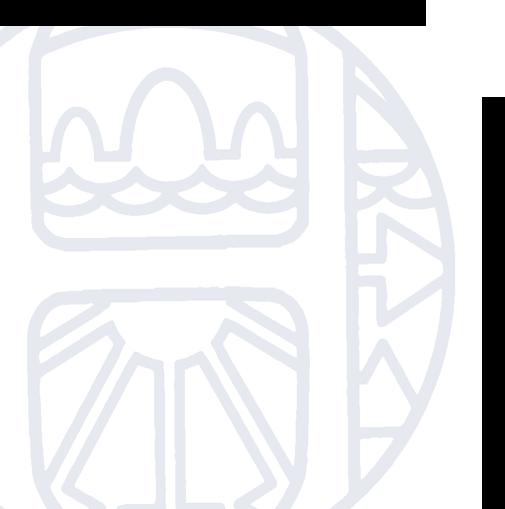


Art and design fine art introduces students to a wide range of different art medias, techniques and processes. The course emphasis is on learning by doing and allows learners to develop their creativity and independent thought.
Students will be introduced to a wide range of experiences, exploring 2 and 3-dimensional media process and techniques. Students will develop their portfolio through sustained practical investigations, informed by contextual studies.

The course allows students to explore more personal themes and ideas. Students choose their own area of study, researching relevant artists, crafts people and designers and use this understanding to develop their own practical work. Practical exploration will be supported by written work that documents how students’ ideas and understanding have developed.
Year 1: Component 1: Portfolio Assessment: No time limit Component 2: Externally set assignment
Assessment: Preparatory period + 10 hours supervised time
Year 2: Component 1: Personal Investigation Assessment: No time limit
Component 2: Externally set assignment
Assessment: Preparatory period + 15 hours supervised time
Are you interested in:

• Media and materials?
• Fine art and print making?
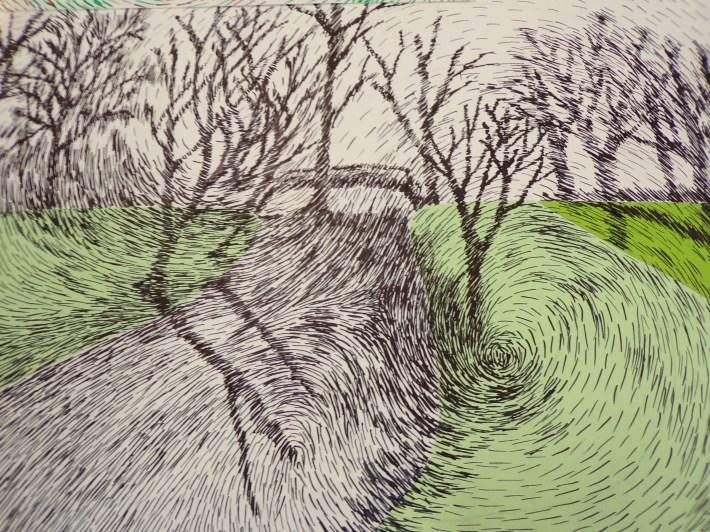
• 3 dimensional design?
• Illustration and design?
• Artists, galleries and museums?
Leading
• Freelance design/ illustration
• Architecture
• Fashion design
• Photography
• Art therapy

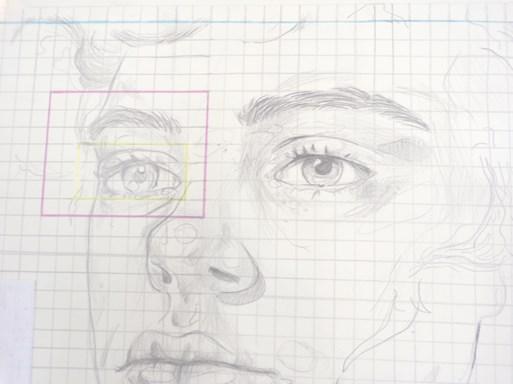
• Art history
• Craft design
Exam Board: AQA Course Code: 7202
The course focuses on creative skills, techniques and processes associated with fine art textiles. It offers opportunities for personal expression in a broad range of techniques in the following specialisms: surface pattern; drawing; decoration; print and dye methods; knit; weave; felt; embroidery and mixed media.

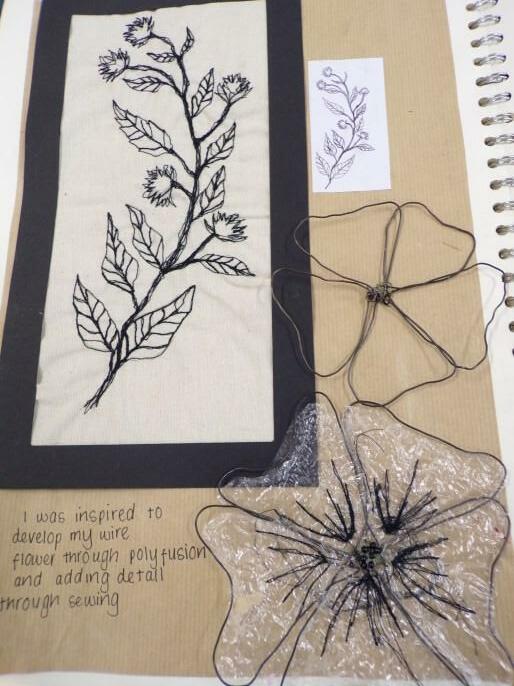



Students are introduced to a wide range of materials, techniques and processes in art and textiles. Students will develop their portfolio through sustained research and investigations in response to a chosen theme.
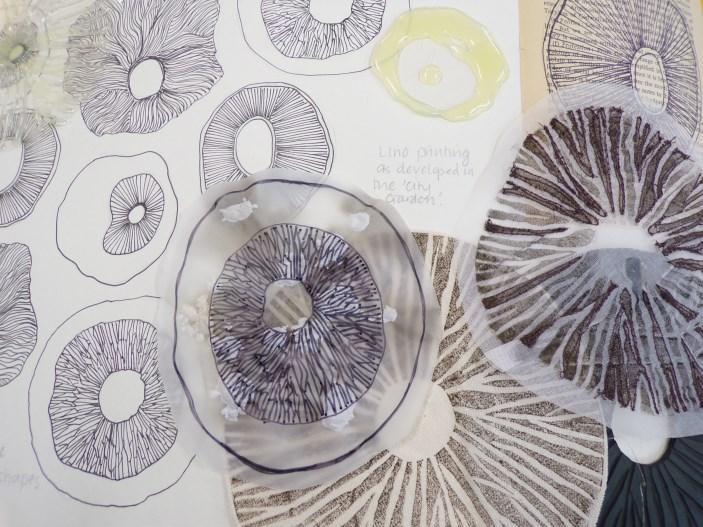
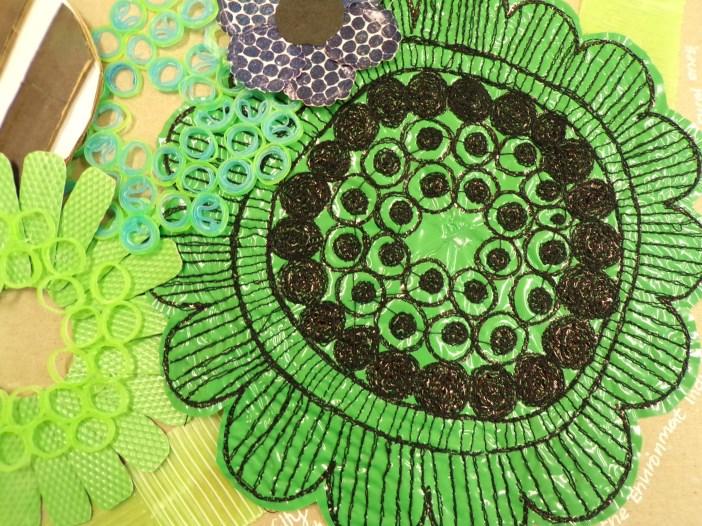
Students choose their own area of study to produce a personal investigation explaining relevant artists, designers and crafts people and developing their own practical work.
Practical investigations will be supported by a written assignment between 1000 3000 words.

Students will be introduced to a variety of experiences that explore a range of photographic media, techniques and processes. They will be made aware of both traditional and new technologies responses to these examples must be shown through practical and critical activities that demonstrate their understanding of different styles, genres and traditions.


Students are introduced to a wide range of techniques and processes in photography. Students will develop their learning through sustained research and investigations in response to a chosen theme.

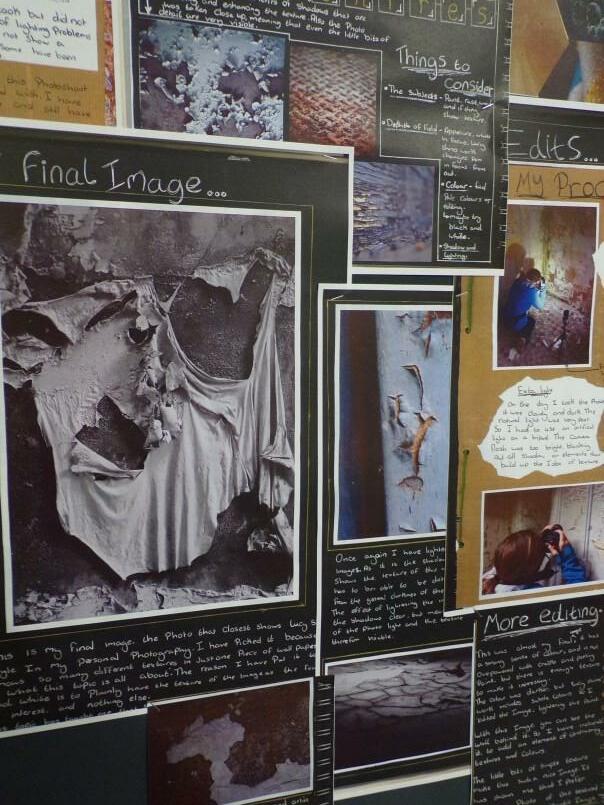
Students will be expected to undertake a personal investigation on a theme of their choice. They will develop a portfolio of work inspired their starting point and exploring a wide range of photographic techniques and processes. Practical investigations will be supported by a written assignment between 1000-3000 words. Assessment criteria Year

Biology is the study of living organisms, how they function and how they interact with each other.

This course has a great blend of topics. Some of which you will already be familiar with from GCSE such as the circulatory system and photosynthesis. Other topics are brand new, such as modern gene technologies including gene cloning, gene therapy and DNA fingerprinting.
If you like GCSE biology, you will loveA-level because you can really get to grips with each topic and make your understanding more complete.
You will enjoy the balance between theory and practical lessons. The practical investigations will give you the chance to develop skills and consolidate your theoretical knowledge.


There are 12 required practicals, six in Year 12 and six in Year 13. These are opportunities to demonstrate your improving competencies in practical work, so that you can achieve a pass in the practical component by the end of Year 13.


Assessment criteria
Year1:2 x 1hr 30min written exam Year 2: 3 x 2hr written exam
Assessment of practical skills will be by written exams only. 15% of the marks in the papers will relate to practical work.


The BTEC Business National Extended Certificate has been developed in conjunction with various companies and institutes including John Lewis, Barclays, Npower, The Peter Jones Foundation and the Chartered Institute of Management. Universities, Professional Bodies and Employers have confirmed that the Diploma meets their entry requirements. This BTEC will be the equivalent of one A Level for UCAS entry. The course will include links with local businesses and the qualification gives the knowledge, understanding and skills that underpin the business sector.
One unit is assessed through exam, another through a controlled assignment set in school, and the others through coursework.
Course content
Exploring Business: This looks at how businesses are organised, how they communicate, the characteristics of the environment in which they operate, and how this shapes them and their activities? You will also look at the importance of innovation and enterprise to the success and survival of businesses. (Coursework)

Creating a Marketing Campaign: You will look at how a marketing campaign is developed, explore different stages of that process which a business goes through and develop your own campaign. (Writtensupervisedassessmentwithprerelease material)
Personal and Business Finance: Personal finance looks at how managing your money can help prevent future financial difficulties. It is vital you understand the financial decisions you will need to take throughout your life and how risk can affect you and your choices. The business finance aspects of the unit introduce you to accounting terminology, the purpose and importance of business accounts and the different sources of finance available to businesses. (Writtenexamination)
An optional unit to be taken from:
• Customer service
• English legal system
• Employment Law
• Potentially some extended work experience
Are you interested in:
• Knowing how to manage your own finances?
• A practical applied approach to learning?
• Setting up your own business?
• Understanding the inevitability of change?
• Finding out about what really happens in the workplace?
• Understanding how teams work together?
• Why businesses make the decisions they do?
• Investigating a range of
• business case studies?
• The reality behind The Apprentice?
• How the economy, politics, social trends and technology can impact on business?
• The considerations when setting up a new business?
• How businesses manage change?
Leading to a career in:
• Administration
• Accounting
• Management
• Sales
• Customer Service • Human Resources
• Financial Services
• Marketing • Operations
Exam Board: Edexcel BTEC Business
Thisisagoodschool. Ofsted,May2017
AgoodschoolwithanoutstandingSixthForm. Ofsted,October2012

• Practical Chemistry?
• Applications of Science?
• Problem solving?
Studying the principles of physical, inorganic and organic Chemistry and exploring these through experimental work.
During Year 1 students will look at the relationship between atomic structure, chemical reactivity and patterns in the Periodic Table. This leads onto an introduction to organic chemistry, including alkanes as fuels and the environmental consequences of this use.
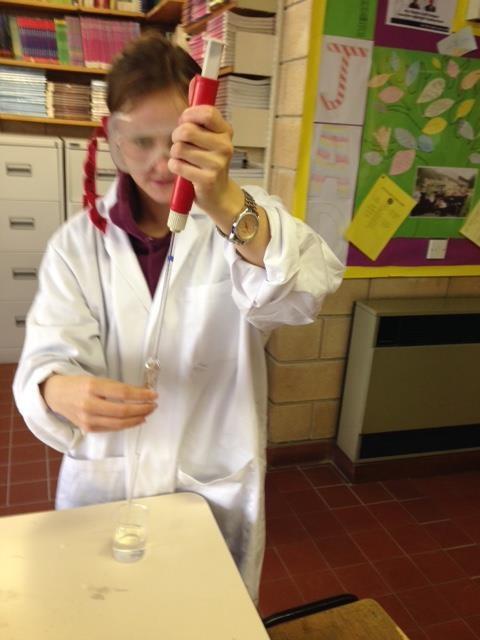


• Chemistry and chemical engineering
• Medicine and related fields
• Veterinary studies
• Biochemistry


• Pharmacy
• Physiotherapy
Exam Board: AQA Course Code: 7405
During Year 2 there is an opportunity for practical investigations to explore thermodynamics, transition metals, organic chemistry and their applications in industry and medicine.
Assessment criteria 100% examination

Year 1 has two module exams and Year 2 has three module exams with assessment of practical skills part of these written module exams.
A separate endorsement of practical skills consisting of six practicals in Year 1 and six in Year 2 will be taken alongside the A-Level which will be assessed by teachers.




The emphasis of this course is on abstract thinking, general problem solving, algorithmic reasoning along with a strong emphasis on mathematical computation. The course develops students’ computational thinking skills and problem solving ability. Students will also develop a range of skills including: high and low level programming languages, network topologies, communication and Boolean algebra.
A range of different group and individual based teaching techniques are used to deliver the course theory. Students are expected to be able to work independently on the majority of the practical aspects of this course and be able to problem solve to find solutions for themselves.
Paper 1: Fundamentals of programming, data structures, algorithms and the theory of computation.
Paper 2: Fundamentals of data representation, computer systems, computer organisation & architecture. The consequences of uses of computing, big data and the fundamentals of communication and networking, databases and functional programming.
Paper 1: 2 hour 30 min on screen exam (40% of A level) Paper 2: 2 hour 30 min written exam (40% of A level) Practical Problem Solutions: (20% of A Level)
Are you interested in:
• Computer programming?
• How the Internet works?
• Solving problems?
• Whether or not a problem can be solved?
• Science
• Engineering
• Software Development

• Network Management
Exam Board: AQA Course Code: 7517
Teaching staff: Mr Davies
Thisisagoodschool. Ofsted,May2017 AgoodschoolwithanoutstandingSixthForm. Ofsted,October2012


This qualification is designed for students who are interested in pursuing a career in the engineering sector and who are interested in engineering technology. The qualification could lead to further study in engineering, or an engineering-related apprenticeship or employment.
Paper 1
This paper is set out through four sets of questions that predominately cover technical principles within each endorsed title.
Learners will be required to:
• Analyse existing products
• Demonstrate applied mathematical skills

• Demonstrate their technical knowledge of materials, product functionality, manufacturing processes and techniques
• Demonstrate their understanding of wider social, moral and environmental issues that impact on the design and manufacturing industries
Paper 2
This component has a series of longer answer questions that require learners to demonstrate their problem solving and critical evaluation skills.
Learners will be required to:
• Apply their knowledge, understanding and skills of designing and manufacturing prototypes and products
• Demonstrate their higher thinking skills to solve problems and evaluate situations and suitability of design solutions

The ‘Iterative Design Project’ requires leaners to undertake substantial design, make and evaluate project centred on the iterative processes of explore, create and evaluate.
Learners identify a design opportunity or problem from a context of their own choice, and create a portfolio of evidence in real time through the project to demonstrate their competence.
This is an excellent opportunity to learn about and experience different aspects of engineering and the science behind it. It will suit students who might be interested in Engineering degrees in the future (possibly when taken alongside Maths and/ or Physics) or Product Design degrees, and those interested in Higher Apprenticeships in Engineering.
Paper1
1 hour 30 minutes written paper 26.7% of total A Level
Paper 2
1 hour 45 minutes written paper 23.3% of total A Level
Iterative Design project
Approx. 65 hours, non exam assessment 50% of total A Level
Are you interested in:
• Engineering
Leading to a career in:
• Mechanical Engineering

• Mechatronic Engineering
• Electronic Engineering
Exam Board: OCR
Teaching staff: Mr Jackson Mr Richardson
Thisisagoodschool. Ofsted,May2017
AgoodschoolwithanoutstandingSixthForm. Ofsted,October2012

Are you interested in:
• Performance?
• Experiencing different live theatre performances?
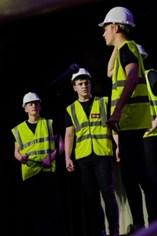
• Working in groups in a creative context?
• Developing strong communication skills?
• Close textual analysis?
• Learning about the craft of the playwright and how plays are structured?
Leading to a career in:
• Performance
• Directing • Theatre production / stage management • Lighting designer / set designer • Teaching • Law • Arts Administration • Psychology • Personnel work • Management


• Other careers working with
Exam Board: AQA
Course Code: 7262
Teaching staff: Miss Bonsall Mrs Rifkin
The A Level course extends the GCSE skills of responding, developing and evaluating in ways that emphasise their interdependence. Students completing the course will have a thorough understanding of drama and theatre, highly toned analytical and creative skills and an ability to communicate effectively with others.
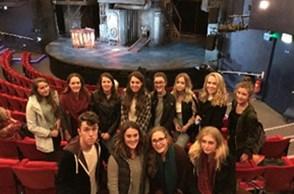
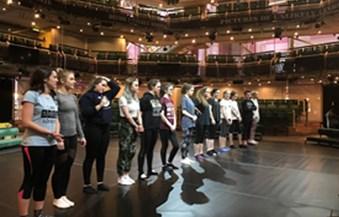
Course Content
Component 1 Drama and Theatre (Written exam)
• Knowledge and understanding of Drama and Theatre.
• Study of two set plays.
• Analysis and evaluation of the work of live theatre makers.
3hourwrittenexam(openbook)
Component 2 – Creating original drama (Practical)
• Process of creating devised drama. The piece must be influenced by the work and methodologies of one prescribed practitioner.

• Performance of devised drama.
Performanceofdeviseddramaplusworkingnotebook
Component 3 Making theatre (Practical)
• Practical exploration of 3 extract texts.
• Extract 3 is performed as a final assessed piece. The piece must have evidence of the methodology of a prescribed practitioner.
Performanceofanextractplusreflectivereport
“Drama helped to develop my confidence. As a new student to the school in sixth form, it allowed me to build friendships as well as improve my leadership skills which have been invaluable during my Midwifery training” Amy.
“It was my most challenging but most rewarding A Level I really enjoyed the balance of practical and academic work.” Jack went on to study History and Politics




Are you interested in:
• Performance?
• Experiencing different live theatre performances?
• Working in groups in a creative context?
• Developing strong communication skills?
• Singing? Acting? Dancing?
• Learning about the craft of the playwright and how plays are structured?
Leading to a career in:
• Performance
• Directing
• Theatre production / stage management

• Lighting designer / set designer
• Teaching

• Law
• Arts Administration
• Psychology
• Personnel work • Management
• Other careers working with
The equivalent to 1 A Level, this course allows students who love to Perform to excel practically and develop their skills towards working in the industry. Students who study this course will also benefit from realistic work based scenarios and projects, as well as practical and theory based workshops. Students completing the course will have a thorough understanding of drama/dance and theatre, highly toned analytical and creative skills and an ability to communicate effectively with others. They will also improve and define their research skills and have multiple opportunities to perform.
UNIT 1 –
Investigating practitioners’ work
UNIT 2

Developing skills and techniques for live performance. UNIT 3 Group performance workshop
UNIT 4 –
This unit is chosen in support of students one the course to suit their talents and requirements. An option of: Jazz Dance Technique Theatre Directing Singing techniques for performers Acting styles.
Miss Bonsall
What is English Language?
It’s a systematic study of the use of English in everyday contexts. Therefore you will learn how to analyse a diverse range of texts including examples such as conversation between a hairdresser and their client, an advertisement for a nightclub or a washing label from a pair of jeans. You will also discover how sociological and psychological factors such as gender and power have an impact on the way language is produced. To do this you will need to learn lots of new technical terms, investigate your own and others’ language use and understand established theories about language.
Unit 1 Exploring Language (40%)
• Language under the microscope
First part focuses on analysing lexical feature, second part on a grammatical feature of a short written text
• Writing about a topical language issue
Piece of original writing focusing on an issue or concept related to language in use where the purpose, audience and form will be given
• Comparing and contrasting texts
The focus of this section is on exploring linguistic connections and comparisons between different modes of texts, for example, in spoken and written texts or different forms of spoken English, which could include British regional dialects
Unit 2 Dimensions of linguistic variation (40%)
• Child language acquisition
The focus of this section is on children’s acquisition of spoken language. The age range to be explored is 0–7 years old
• Language in the media
This section focuses on discourse in a multi modal media text and requires you to apply language concepts and theories to your analysis of linguistic and graphological features. For example, you may consider relevant theories of language and power; language and gender or language and technology

• Language change
The focus of this section is on the analysis of historical varieties of English. The analysis will be based on drawing connections and comparisons between two texts from the 1600s to present day

NEA Independent language research (20%)
An independent investigation of language on an area of study which is of particular personal interest plus an academic poster where you present your research
Assessment criteria
Two exams worth 40% each and coursework worth 20%
Are you interested in:
• Analysing texts?
• Developing your own creative writing skills?
• Exploring the effective use of language?

• Learning about grammar and its usage?
• Journalism and the media
• Teaching
• Publishing
• Advertising
• Legal Profession
• Any job with an emphasis on communication
Exam Board: OCR Course Code: H470
Teaching staff: Mr Hodkin Mrs Key
Thisisagoodschool. Ofsted,May2017
AgoodschoolwithanoutstandingSixthForm. Ofsted,October2012

English Literature is the study of literature written in the English language. Literature is any written work that is deemed to have artistic or intellectual value, such as novels, poetry and plays. The writers do not necessarily have to be from England but can be from all over the world. English Literature deals with universal themes and values; it also teaches us about different time periods and faraway places.
Aspects of tragedy (40%)
We will look at one Shakespeare play, one modern play and one poetry text.

Othello (Shakespeare)
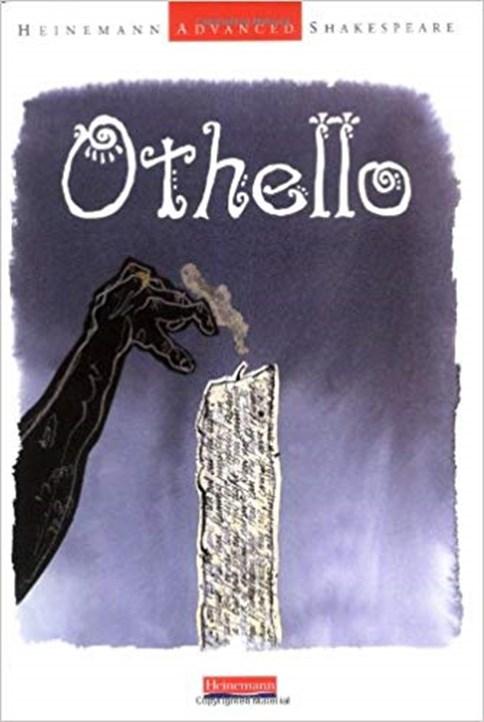
· Death of a Salesman (Arthur Miller)
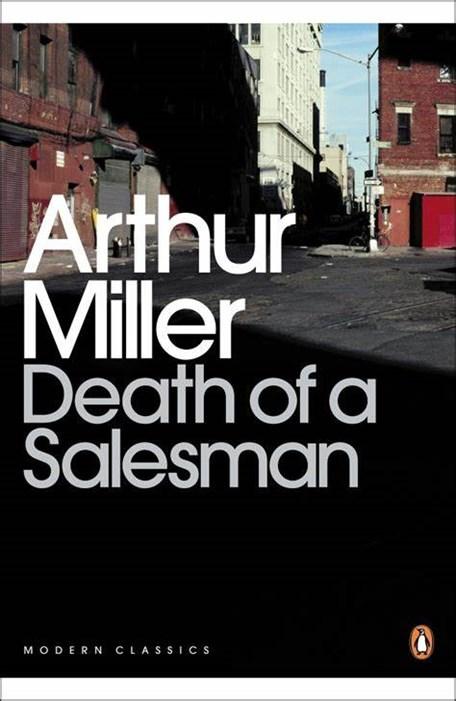

· 4 poems by Keats

Crime Writing(40%)
There will be one novel written after 2000 and two texts including poetry and one pre 1900 text
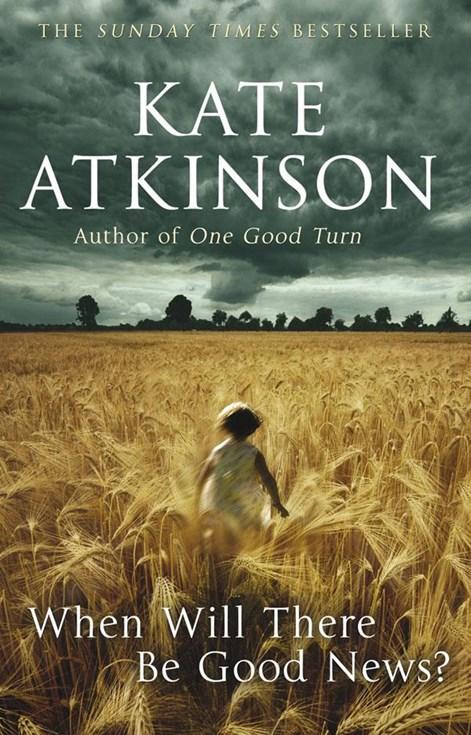
• Rime of the Ancient Mariner (Coleridge)
• When Will There be Good News (Atkinson)
• Brighton Rock (Greene)
• An unseen passage for the exam
Coursework (20%)
• Two texts for coursework (one poetry and one novel). Students will have the opportunity to choose their own texts here and will produce two essays of 1200 1500 words linking their texts to literary theories (feminism, Marxism, ecocriticism etc)
Two exams worth 40% each and coursework worth 20%

The EPQ is a stand alone qualification taken in addition to your A Level studies. The EPQ should not be counted as one of your A Level choices. It is the equivalent of an AS level and carries the equivalent UCAS points. It is a piece of independent research based upon any particular area of interest, but should not already be part of your A Level study. Typically projects test a hypothesis and involve a wide range of resourced information, surveys, interviews and data collection.
The EPQ is a written academic style report, a record of the process, a presentation and review/reflection of your project. It is internally assessed, and all of these elements form part of the overall mark. You will be assigned a Supervisor who will advise and support you through the project.
The EPQ project can take many forms; either a min 5000 word academic style dissertation or a shorter academic report supported by an artefact which could be an artwork, a visual media such as a film or animation, a play or piece of music. The EPQ is supported by a timetabled taught element of one period a week learning study and research skills to support your project.
EPQ projects are marked internally by the EPQ Supervisors to four Assessment Objective (AO) criteria and are standardised by the Course Co ordinator. Projects are externally moderated.
A01 Manage (20%)
A02 Use Resources (20%)
A03 Develop and Realise (40%)
A04 Review (20%)
• How far has the use of Friedrich Nietzsche’s philosophy by far right movements been justifiable?
• Since 2000, has the legislation and regulation around state surveillance developed in a manner which is fit for purpose?

• The potential development of CRISPR Cas9 as a method for treating disease

• Is Music Preference Biologically Hardwired or a Cultural Creation?
It is not necessary to study an EPQ to gain a place at University, however, the EPQ is recognised by universities as an invaluable tool to equip undergraduate students with independent study skills.
Many university interviews will refer to EPQ study and in some cases offers may be amended on the basis of a good grade in the EPQ.
Exam Board: AQA Course Code: 7993
Supervising staff: Mr Flett Course Co-ordinator: Mr Flett
Thisisagoodschool. Ofsted,May2017 AgoodschoolwithanoutstandingSixthForm. Ofsted,October2012


Film Studies at Highfields is an exciting new subject which you may not have studied at GCSE. It is not necessary to have done GCSE Film Studies to do A Level. You will never look at a film in the same way once you have begun this course!



The course is designed to deepen students’ appreciation and understanding of film, a major art form of the 20th Century. Now film is over 100 years old and you will have the chance to delve into its history, studying influential movements and international film styles from the past and present. Recent new technologies have meant that film has become a method of self expression that is accessible to a growing number of people—the youth of today are adults of the future and will need the ability to use this powerful tool for communication as well as to analyse and interpret its messages and values.
Not only will you benefit from learning an academic and theoretical approach to film but you get hands on opportunities to experience the practical process of planning, shooting and editing your own short film. The department is fully equipped with HD and DV cameras and with the industry preferred editing software, Final Cut Pro.
A level French provides an engaging and exciting opportunity for you to build on your previous study of French. Through social, intellectual, historical, political and cultural themes you will be able to develop your linguistic knowledge and cultural understanding of the countries/communities where the language is spoken. Studying literature and film will allow you to undertake a deeper analysis of language structures and increase your cultural awareness .A strong focus is placed on building your confidence and fluency in spoken French using relevant and topical themes. The requirement to research an area of personal interest related to the country/ communities where French is spoken will enhance your cultural appreciation and enable you to gain a greater awareness of intercultural differences.
Being a young person in French speaking society: Family structures, traditional and modern values, friendships/relationships, citizenship. Youth trends, issues and personal identity Educational and employment opportunities.

Understanding the French-speaking world: Regional culture and heritage in France and French speaking countries and communities France in a European context Literature, art, film and music in the French speaking world
Migration and integration; cultural identity and marginalisation; the positive aspects of a diverse society; discrimination and diversity France 1940-1950: The Occupation and the postwar years Life in occupied France, the resistance, the cultural dimension and reconstruction.
In Year 13 students will undertake independent research on a cultural topic of their choice
Assessment criteria
Component 1: Speaking 30% Component 2: Listening, reading and translation 50% Component 3: Written Paper 20%
Are you interested in:
• Understanding how language works?
• Living or working abroad?
• Social and cultural issues?
• Communicating with others?
• Impressing employers?
• Increasing your salary potential?
Leading to a career in:
• Business with international links
• Employment which requires communication, research and analytical skills
• Marketing
• Teaching
• Interpreting & translating
• Law
• Management
• European related jobs
• Travel & tourism

Exam Board: WJEC/ Eduqas Course Code: 603/0071/1
Teaching staff:
Mrs Bowen
Mrs Sayers
Mr Roberts
Thisisagoodschool. Ofsted,May2017 AgoodschoolwithanoutstandingSixthForm. Ofsted,October2012

Are you interested in:
• The world around you?
• The challenges facing the environment?
• Understanding other cultures?
• The pressures and opportunities of world cities?
• Fieldwork and active research?
• A bridge between both arts and sciences?
Leading to a career in:
• Conservation
• Travel and tourism
• Local Government planning
• Resource management
• Meteorology and climatology, including climate change
• Law
• Multi National Organisations
Geography is the study of the world around us and man’s impact on it. It considers the physical and human influences that shape and style our world including climate change, immigration, extreme climates, earthquakes, regeneration of cities and tourism.
• Year 1 content includes both physical (Tectonics) and human geography (Changing Places) plus geographical skills as well as an optional unit on Coasts.
• In Year 2, additional physical themes are Water/Carbon Cycles and Ecosystems while human themes are Global Governance and India
Fieldwork days - these will include work in Ringinglow and Sheffield for Human Geography, The Peak District and the Yorkshire coast for Physical Geography. Students will undertake an independent study.

80% examination: one fieldwork investigation worth 20% and three examinations on syllabus content.

Thisisagoodschool. Ofsted,May2017 AgoodschoolwithanoutstandingSixthForm. Ofsted,October2012

What is Geology?
Geology is the ‘Earth Science’. Geology is an accessible and practical science that involves the study of the Earth: its structure; the processes that form rocks; the role of plate tectonics in creating earthquakes and volcanoes, how fossils show how life has evolved on Earth and how it shapes everyday life from toothpaste to tsunamis, from landfill to landslips. There is a requirement for field based learning and skill development.
Students learn about the Earth, its structures, evolution and dynamics. It develops four main concepts:
• Elements, minerals and rocks: How elements make up minerals which in turn make different types of rock.
• Surface and internal processes of the rock cycle: Weathering and erosion to deposition and diagenesis.
• Time and change: Including the study of fossils, including trilobites, ammonites and dinosaurs.
• Earth structure and global tectonics: Including the study of earthquakes and volcanoes.
In addition to increasing the depth of understanding from Year 1 topics including:
• Natural Resources: the formation, exploration and extraction of natural resources, such as metals and petroleum
• Past life and Past Climates: the evolution of life from the Pre Cambrian to the present and the study of climate change through time.
• Rock Forming Processes: from the formation of igneous rocks from magma to the structures formed during tectonic processes folding and faulting.
• Rock Deformation: how structures including folding and faulting occurred and what they can tell us about the forces involved. Students also choose one of three special topics which include:

• Geohazards of earthquakes, volcanoes and landslips.
• The geological evolution of Britain how our country was shaped by its geological setting in the past.
Are you interested in:
• Fossils, including dinosaurs?

• The evolution of life on Earth?
• The causes of mass extinctions?
• Minerals and rocks?
• Climate changes past and present?
• Plate tectonics
• Earthquakes & volcanoes?
• Fieldwork?
• Travel?
Leading to a diverse career in areas with a shortage of qualified people: (source: United Kingdom Visa Bureau)
• Field geologists.
• Geochemists
• Environmental scientists
• Engineering geologists
• Geophysicists
• Geo environmental specialists
• Groundwater engineers
• Hydrogeologists

• Geotechnical engineers

• Petroleum or mining engineers
• ..and many more
Exam Board: WJEC Course Code: 603/0859/X
Teaching staff: Mr Fairhurst Miss Hughes
Assessment Criteria
3 examinations with a large practical element, also testing the skills developed during fieldwork.
A practical endorsement will also be reported as a separate item at A level.
Are you interested in:
•
• Living or working abroad?
• Social and cultural issues?
• Communicating with others?
• Impressing employers?
• Increasing your salary potential?
The course develops your listening, speaking, reading writing and translation skills as well as your general knowledge of the countries where German is spoken. You will develop these skills through researching and discussing topics in written and spoken language. You will study a novel (Der Vorleser) and a film (Die Welle) and put them in to their cultural and historical context. There will be an opportunity to have oral classes with a native speaker during the year.
•
Social Issues and Trends Education, work and travel, diversity and local festivals Youth culture and the making of modern society Political, intellectual and artistic culture including entertainment, the arts, architecture and new media.
In Year 13 students will undertake independent research on a cultural topic of their choice linked to a German speaking country (examples of previous chosen topics include the influence of the Berlin Wall on the ballet scene in Berlin, the importance of the German civil aviation industry in the 20th & 21st Centuries and how the role of women changed during the Weimar Republic and Third Reich).
Thisisagoodschool. Ofsted,May2017 AgoodschoolwithanoutstandingSixthForm. Ofsted,October2012



Are you interested in: How communication shapes relationships?
How diseases can affect the body and the person?
How the law has developed to ensure safeguard-
Leading to a career in:
Nursing Healthcare
Social work
Early childcare studies Elderly care Midwifery Management

Exam Board: OCR
Course Code: 05831
Teaching staff: Miss Burgess Mrs Redhead
24
The Health and Social care course is for learners who want to study health science, social care or childcare.
You will look at the importance of relationships and communication, and the key factors that affect our health.
The course is a mixture of assignments and exams which make up six units.
There are four mandatory units: Building positive relationships in health and social care, Equality, diversity and rights in health and social care, Health, safety and security in health and social care and Anatomy and physiology for health and social care.
A further two optional units make up the extended certificate qualification.
You will get the opportunity to carry out work experience in order in gain the skills needed to work in this sector.
Assessment criteria 3 x Examination over the two years 3 x Assignment based units. The four mandatory units make up 75% of the extended certificate
Thisisagoodschool. Ofsted,May2017 AgoodschoolwithanoutstandingSixthForm. Ofsted,October2012

Students will need to become familiar with a large amount of background material, but will also need to be able to analyse this and produce from it reasoned arguments in response to specific questions. They will also need to be familiar with sources from the periods studied and be able to evaluate them.

Unit 1: Great Britain 1900 51 Students will learn about the key political events around this time period.

Unit 2: Russia 1645-1741 Students will learn about the reign of Peter the Great, as well as what came before and after him.



Unit 3: Civil Rights in the USA 1865-1992 This unit focuses on the struggle of citizens in the United States to gain equality before the law.
Unit 4: Coursework - Peter the Great Students write an independently researched essay of 3000 4000 words based around Russia 1645 1741.
Assessment criteria
Unit 1: Examination of 1 hour 30 minutes 25% Unit 2: Examination of 1 hour 15% Unit 3: Examination of 2 hours 30 minutes 40% Unit 4: Coursework 20%
What is Core Maths?
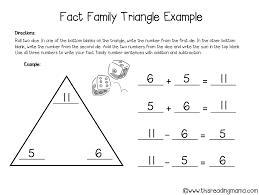
Core Maths is the qualification for those who want to keep up their valuable maths skills but are not planning to take AS or A level mathematics. At the end of the two year course, students will come out with a level 3 qualification with equivalent UCAS points to an AS level.
The new qualification is for students who have passed GCSE Mathematics at grade 5 or above. It builds upon and strengthens existing skills and focuses on using and applying mathematics to solve problems relevant to their everyday lives.
Core Maths builds on GCSE maths with a sharper focus on problem solving skills by considering and tackling mathematics in meaningful contexts. This includes financial applications of mathematics as well as further statistical ideas that can support work in other subjects they will be studying at A level such as psychology, health sciences, geography, sociology and even history.
The 2 year linear course consists of 2 exam papers at the end of Y13. Both papers have a maximum of 60 marks. There is no coursework. Frequent assessments will be done within school so that students are aware of their progression towards their target grade.
Paper 1 is a 1 hour 30 minutes written exam with the following compulsory content: Analysis of data, Maths for personal finance, Estimation
Paper 2 is a 1 hour 30 minutes written exam with the following compulsory/Optional content: Compulsory: Critical analysis of given data and models
Optional: The normal distribution
Probabilities and estimation
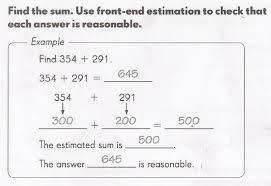
Correlation and regression or
Critical path and risk analysis
Expectation
Cost benefit analysis or
Graphical methods
Rates of change

Exponential functions
Thisisagoodschool. Ofsted,May2017 AgoodschoolwithanoutstandingSixthForm. Ofsted,October2012

Sixth Form Prospectus for the school year 2023-24
Are you interested in:
• The language of the universe?
• How real life situations are modelled with Mathematics?
• How important decisions are made based on statistics?
• How Mathematics is the starting point for computer programming?
• Mathematics for its own sake?
Leading to a career in:
• Finance
• Computing
• Medicine
• Architecture
• Statistical Research
• Engineering Exam Board: OCR
Course Code: H240
Mathematics has developed over time as a means of solving problems and also for its own sake. Mathematics can stimulate moments of pleasure and wonder when you solve a problem for the first time, discover a more elegant solution, or notice hidden connections.


Pure Mathematics: Proof, Algebra and functions, Coordinate geometry, Sequences and series, Trigonometry, Exponentials and logarithms, Differentiation, Integration
Mechanics: Vectors, Quantities and units in mechanics, Kinematics, Forces and Newton’s laws
Statistics: Statistical sampling, Data presentation and interpretation, Probability, Statistical distributions and statistical hypothesis testing
Pure Mathematics: Proof, Algebra and functions, Coordinate geometry, Sequences and series, Trigonometry, Exponentials and logarithms, Differentiation, Integration, Numerical methods
Mechanics: Vectors, Quantities and units in mechanics, Kinematics, Forces and Newtons laws, Moments
Statistics: Statistical sampling, Data presentation and Interpretation Probability, Statistical distributions, Statistical hypothesis testing
Teaching staff: Mr Brooks Mrs Brown Mr Moss

There are 3 exam papers which are 2 hours long and have a maximum of 100 marks. There is no coursework. Frequent assessments will be done within school so that students are aware of their progression towards their target grade.
Thisisagoodschool. Ofsted,May2017 AgoodschoolwithanoutstandingSixthForm. Ofsted,October2012

Further Mathematics extends the understanding gained in A level Mathematics to higher levels, as well as exploring topics afresh. It is advantageous to students who are considering studying Mathematics at university. Also, students who study Physics and Engineering will benefit from studying mathematics at this level.
Paper 1 and Paper 2 both consist of a mix of question styles, from short, single mark questions to multi step problems taken from the following Pure Mathematics topics: Proof, Complex numbers, Matrices, Further Algebra and Functions, Further Calculus, Further Vectors, Polar coordinates, Hyperbolic functions, Differential equations, Trigonometry, Coordinate geometry
Paper 3 consists of a mix of question styles, from short, single mark questions to multi step problems and students can choose 2 of the following 3 sections Statistics, Mechanics and Discrete maths.
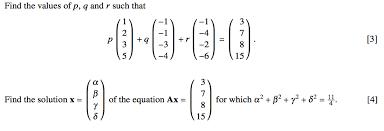
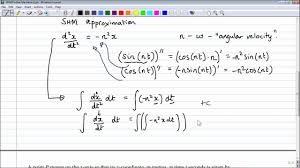
Statistics: Discrete Random variables and expectation, Poisson Distribution, Type 1 and type 2 errors, Continuous random variables, Chi Tests for association, Exponential Distribution, Inference one sample t distribution
Mechanics: Dimensional analysis, Momentum and collisions, Work, energy and power, Circular Motion, Centres of Mass and Moments
• The possibility of learning about areas of mathematics that you never knew existed?
• Being challenged to the limit of your understanding?
• Developing your sense of fun and achievement at solving problems of great depth?
• Do you love maths?
Leading to a career in:
• Finance
• Computing
• Medicine
• Architecture
• Statistical Research
• Engineering
Exam Board: OCR
Course Code: H245
Teaching staff:

Mr Brooks Mrs Brown Mr Moss
Thisisagoodschool. Ofsted,May2017 AgoodschoolwithanoutstandingSixthForm. Ofsted,October2012

The Music course extends the GCSE skills of performing, composing and appraising in ways that emphasise their interdependence. Engagement with the widest possible range of music is encouraged and there are increased opportunities for the development of skills and understanding.






In Year 1 you will analyse music from the classical pop, jazz and film traditions with the aim of broadening your understanding of how music works. You will follow a course of formal harmony alongside more free composition projects and are expected to engage fully with the extensive performance opportunities in the department.
In Year 2 you will continue to perform regularly and additional set works will provide material for analysis. You will further develop skills in the techniques of composition and submit a portfolio of works along with a technical study focusing on harmony. You will perform an extended solo recital.
Your grade is based on individual or ensemble performance, composition, and developing and demonstrating your musical understanding through close analysis of set works.
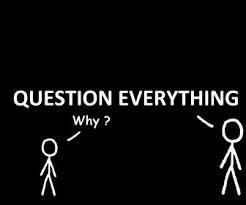

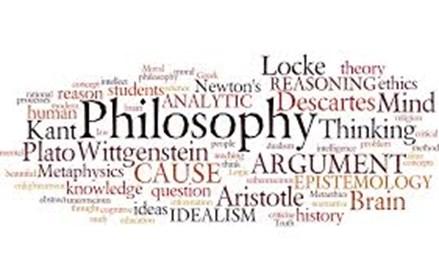
The study of philosophical ideas about knowledge, concepts of God, ethics and understanding the mind.


Epistemology Explores our immediate objects of perception, what knowledge is, where knowledge comes from and the limits of knowledge.
Moral Philosophy The exploration of ethical theories and how we decide what is morally right, with application of different ethical theories to issues such as stealing and telling lies.
Metaphysics of God Examines different arguments for the existence of God and how these are expressed through language.
Metaphysics of Mind Study of the mind and body and the connection between the two and their purpose.
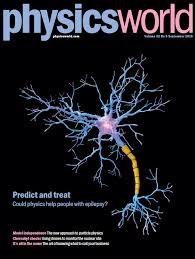


Physics explains the world around us, from galaxies to sub atomic particles. Physics also enables us to change the world through the work of engineers, designers and technologists. From your GCSE studies you will realise whether you have the curiosity, interest and ability to pursue this subject further. To study Physics you must first come with an enquiring mind. We aim to develop your qualities of self motivation, determination and appetite for challenge.
Course content Year 1
Unit 1: Measurements and their errors Unit 2: Particles and radiation Unit 3: Waves Unit 4: Mechanics and materials Unit 5: Electricity
Course content Year 2
Unit 6: Further mechanics and thermal physics Unit 7: Fields and their consequences Unit 8: Nuclear physics Unit 9: Option Topic
Assessment criteria
Paper 1: Short, long and multiple choice questions Units 1 5

Paper 2: Short, long and multiple choice Units 6-9
Thisisagoodschool. Ofsted,May2017 AgoodschoolwithanoutstandingSixthForm. Ofsted,October2012

• Consciousness, thought processes and how the mind works?
• The relationship between mind and body, e.g. stress?
• Individual differences and mental disorders?
• The extent to which study of the human being can be scientific?
• The effects of nature (genetics and evolution)?
• The effects of nurture (the environment, learning and the media)?
Leading to a career in:
• Personnel
• Social work
• Teaching or childcare
• Counselling
• Medicine
• Police
• Sport psychology
• Media
Exam Board: AQA
Course Code: 2181
Teaching staff:
Mr Flett Miss Ould
Mr Cole
Psychology is the scientific study of behaviour and experience. The course focuses on the influence of both biological and psychological factors on individuals. The different theoretical and methodological approaches of behaviourists, psychodynamic, cognitive and social psychologists, as well as those who favour the biological approach are recurring themes throughout the course. An evaluation of the research methods and analytical techniques used within the discipline are an integral part of all of the Year 12 and Year 13 units.
We look at a range of topics including:
• Memory: Looking at how we remember/forget information.
• Attachment: This is about the relationships which babies and young children form with adults.
• Social Influence: We look at questions like ’why do most people follow the crowd?’ (this is called conformity).
• Psychopathology: We consider different explanations and different treatments for mental health problems.
• Research Methods: Evaluating different methods of investigation, as well as data handling and analysis.
We will recap the topics from Year 1 and introduce new ones such as:
• Biopsychology: Looking at the structure of the brain and biological rhythms.

• Issues and debates: Discussing the relative contribution of nature and nurture.
• Aggression: We consider why people act more aggressively in group situations.
• Schizophrenia: Looking at the causes and treatments of this disorder.
• Relationships: We consider why we find certain people attractive and why we are so concerned with celebrities.
All the course is assessed by exams.
Three exams - all 2 hours long.
You are tested on your knowledge of Psychology, your ability to evaluate it, apply it and discuss the Research Methods used in it. There will be a mixture of multiple choice, short answer and extended writing questions.

Thisisagoodschool. Ofsted,May2017 AgoodschoolwithanoutstandingSixthForm. Ofsted,October2012

Sociology is the study of people in Society. It looks at the behaviour of groups and the interaction between individuals. It examines different Sociological Theory and evidence around Social Order and Conflict in Society and evaluates Sociological Research Methods. It builds analytical, critical and transferable intellectual skills.
Paper 1 2 hour exam
Education: The role and functions of the education system. Why do we have differential educational achievement of social groups by social class, gender and ethnicity in society. Identities and subcultures, the hidden curriculum and Government Policy on education.
Theory and Methods: Research design and sources of data for Sociologists. The theoretical, practical and ethical considerations influencing choice of topic, choice of method and the conduct of research.
Paper 2 Topics in Sociology 2hr Exam
Families and Households: The relationship of the family to social change and changing patterns of marriage, cohabitation and divorce. Family diversity and gender roles, domestic labour and power relationships within the family. The nature of childhood, and changes in the status of children in the family and society.
Beliefs in Society: The conflict between Ideology, Science and Religion. Social change and religious beliefs. New Religious movements such as, Cults, Sects and New Age movements. The Global significance of religion and Fundamentalism.
Paper 3 2 hr Exam
Crime and Deviance: Crime, deviance and Social control, Who commits Crime? New types of Crime such as Cyber and Environmental crime. How do the media exaggerate Crime? The State and Surveillance in the 21st Century. Prison and punishment and how effective it is in preventing Crime.
-24
• People?
• Social issues?
• Current affairs?
• Diversity and difference?
• Understanding society?
• Social change?
Leading to a career in:
• Law
• Police • Criminology
• Human Resources • Journalism • Teaching
Exam Board: AQA Course Code: 7192
Teaching staff: Miss Llewellyn Mr Cole
Thisisagoodschool. Ofsted,May2017 AgoodschoolwithanoutstandingSixthForm. Ofsted,October2012




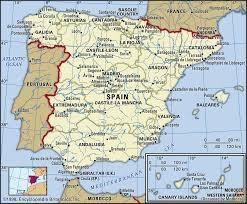


The course develops your listening, speaking, reading writing and translation skills as well as your general knowledge of the country. You will develop these skills through researching and discussing topics in written and spoken language. You will study texts and films and put them in to their cultural and historical context. There will be an opportunity to have oral classes with a native speaker during the year.

Social Issues and Trends Travel, diversity and local festivals Youth culture and the making of modern society Political, intellectual and artistic culture including entertainment, the arts and new media
In Year 13 students will undertake independent research on a cultural topic of their choice
Component 1: Speaking 30% Component 2: Listening, reading and translation 50% Component 3: Written Paper 20%
Sixth Form Prospectus for the school year 2023-24
What is Sport Level 3 Extended Certificate?

This course is designed to aid preparation for future work within the sports industry. The course is built up of units to which you will have to meet certain criteria to achieve certain levels.
There are 3 mandatory units and 1 further unit that you will study.
Two of the units will be assessed via coursework/ portfolio/evidence from your teachers and there will be one unit assessed externally as a written examination, and one unit that you will complete as a pre release scenario task, which you will be able to take notes into the room to complete the assignment.
Unit 1: Anatomy and Physiology.
Unit 2: Fitness Training and Programming for Health, Sport and Well being.
Unit 3: Professional Development in the Sports Industry.
Unit 7: Practical Sport Performance. Assignment briefs and external assessment
Unit 1: The Anatomy and Physiology unit will be assessed as a written exam 1.5 hours. • 90 marks
Unit 2: The Fitness Training and Programming for Health, Sport and Well-being unit will be assessed via a set task.
Set tasks learners demonstrate understanding through completion of a vocational task.
• In Part A, learners will be given a case study two weeks before a supervised assessment period in order to carry out research.
• In Part B, the supervised assessment period is two hours over a period of two days.
Written submission 60 marks.
The other units are assessed by your PE teachers within your BTEC lessons, a sample will then be checked by external standards verifiers to make sure your work is the grade your teacher says it is and check your progress at certain times of the year.
Are you interested in:
• Sport in all its forms?
• Analysing and improving performance?
• Performing practically?
• Teaching
• Sports development
• Physiotherapy
• Sports journalism
• Personal trainer
Thisisagoodschool. Ofsted,May2017 AgoodschoolwithanoutstandingSixthForm. Ofsted,October2012

The Level 3 Higher Sports Leaders Award is a nationally recognised qualification that enables successful students to lead un supervised groups of people in sport and recreational activities. This builds upon the skills and experience gained through the Level 2 Community Sports Leadership and Level 2 Sport Leadership.
The qualification teaches generic leadership skills such as organisation, planning, communication and teamwork through the medium of sport. It is a fun, practical qualification with the only requirement that the learner has successfully completed the Level 2 Award in Year 11 or 12. There is no final written exam only a practical moderation of the student leading a group of young people.

There are 107 guided learning hours which includes 30 hours demonstrating leadership. The course at Level 3 carries 16 UCAS tariff points.
Students are required to attend sessions consistently and bring practical wear for all lessons. Students lead sessions with local primary school pupils and our own Highfields students.
Sports Leaders UK is a national organisation and at Highfields we have followed these courses for over 10 years and the Sports Leadership Academy is a Queens Award Winning Academy and the centre has international status for the delivery of these awards.
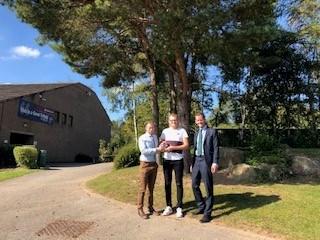

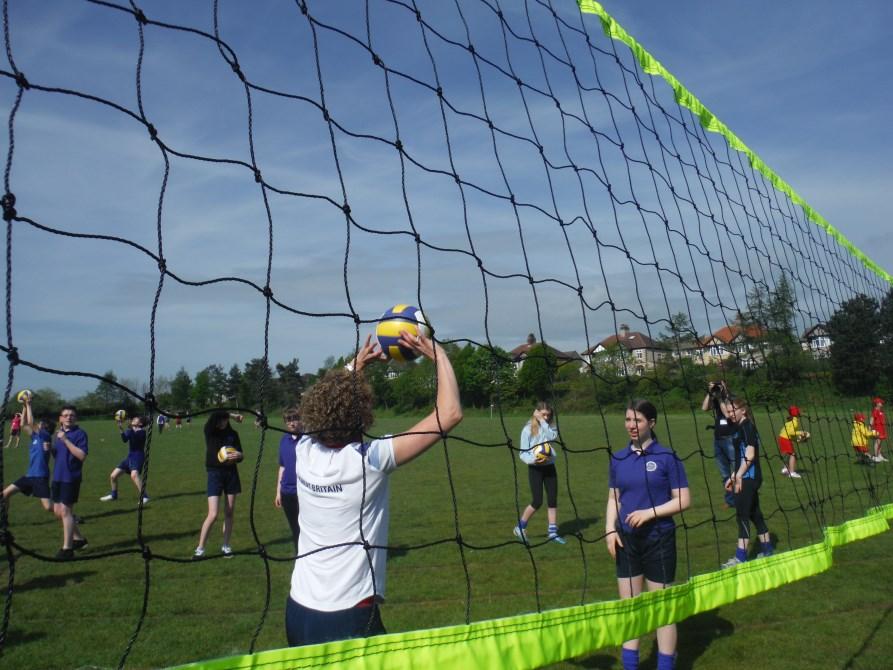
Students also have the opportunity to take a one day Sportsleaders UK Course called Go Lead which is a nationally recognised and accredited Leadership Award.

Results Days have been happy events too. Typically between 75% to 85% of students go to university, with other students choosing higher and degree apprenticeships, local education courses and employment. Of those going to university, between 80 and 85% will make their first choice, with practically everyone getting into their second choice.
There have been great stories across the board, several students leaving for sought after Degree and Higher Apprenticeships with Balfour Beatty, National Grid and Jaguar Land Rover. In recent years a good number of students have gone on to study Medicine, Dentistry and Veterinary Science. Oxbridge students have gone to study Maths, English, Natural Sciences, Politics, Philosophy, History, German and Computer Science. Others have gone on to Architecture, Law, Languages, English and History at highly competitive universities including UCL, Warwick, Durham and Imperial College. All the subjects taught at Highfields have been represented in degree course choices.
This is the mean average. This is calculated by adding up all the point scores from each of your subjects and dividing by the number of subjects you are taking as shown in the tables below.
Thisisagoodschool. Ofsted,May2017 AgoodschoolwithanoutstandingSixthForm. Ofsted,October2012


November 2022
Publication of Sixth Form Prospectus and Sixth Form Open Evening Thursday 10 November (6.00 8.30pm in the Wheeldon Hall, Lumsdale site).
Students will be asked to indicate their preference choices of A-Level subjects after the Open Evening.
December 2022
Option Blocks created in response to demand.
Year 11 Mock Examinations w/c 22 November and w/c 28 November
January March 2023
Students choose from option blocks and are interviewed to help understand and guide their choices.
June 2023
Provisional Sixth Form Induction Days (Tuesday 27 June and Wednesday 28 June)
August 2023
On GCSE Results day, Thursday 24 August, every student will have their choices confirmed or, in the case of lower than expected results, we will check the choices made are the most appropriate.
2023 2024 Provisional Holidays
Thisisagoodschool. Ofsted,May2017 AgoodschoolwithanoutstandingSixthForm. Ofsted,October2012


Highfields School

Upper Lumsdale Matlock Derbyshire DE4 5NA
Tel: 01629 581888 Email: info@highfields.derbyshire.sch.uk www.highfields.derbyshire.sch.uk
